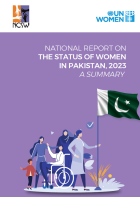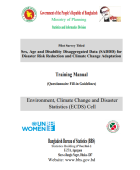1 - 20 of 24 Results
Pagination
Date:
Key knowledge gaps can hamper delivery of effective response and prevention programmes. There is little comparable, reliable data on the prevalence, forms, impact, and drivers of technology-facilitated gender-based violence (TFGBV) across different global regions and social intersections.
Date:
This report highlights some regions and countries of the world that have recorded a slight decrease in the number of femicides, hence contributing to global knowledge of how to effectively prevent femicides. The report reveals that the number of countries reporting on femicides has decreased by 50 per cent in the past five years.
Date:
The report supports the Beyond GDP initiative, which aims to include metrics on well-being and environmental sustainability in measuring progress. Addressing the limitations of traditional economic measures like GDP from a gender lens, it advocates for a more inclusive approach that acknowledges the value of care work and women’s financial inclusion and decision-making in climate action.
Date:
As part of the project, UN Women partnered with six educational institutions from Cumilla, Bogura and Patuakhali districts to implement safe campus interventions and adopt a ‘whole of school approach’ to prevent sexual harassment (SH) and other forms of violence against women on campus premises.
Date:
The analysis identified trends from discourse data generated across social media platforms and search engines. In particular, big data on people’s search behaviour on VAWG-related topics (both before the onset of the pandemic and since) were considered.
Date:
This report, prepared by UN Women and UNDP, highlights the global challenges faced by women and provides a roadmap for targeted interventions and policy reforms.
Date:
This summary report encapsulates the consolidated data from the first National Report on the Status of Women in Pakistan in 2023, providing a snapshot of the situation of women on key themes related to Gender Equality and Women Empowerment.
Date:
Globally, there is growing recognition that policy should be informed by indigenous knowledge systems. Indigenous knowledge frameworks and methodologies have been used productively to inform health policies, to support mental health and well-being, to foster sustainable development, and respond to climate change. These topics have some relevance for Filipino migrant workers, and we can therefore expect indigenous approaches to understanding their experiences and issues to be fruitful. Having a better understanding of context, culture, and patterns of communication can lead to improving our responses, their relevance, and their accessibility
Date:
To put in place inclusive strategies that increase the resilience of women and men in all their diversity, there is an urgent need to better understand the gendered effects of climate change across countries. To achieve this, this paper explores the connections between phenomena related to climate change and gender related outcomes in Bangladesh, Cambodia, Nepal, the Philippines and Timor-Leste. In particular, it tests these associations by utilizing random forest machine learning techniques and binary logistic regression analysis, on a data set that integrates data from Demographic and Health Surveys (DHS) and geographical information systems (GIS).
Date:
A technical paper on Philippine overseas labor migration data collection and analysis from a gender perspective
Date:
This Gender Alert concludes that the 24 December 2022 ban: (1) is discriminatory and dictates who humanitarian actors can(not) employ, and who they can reach with assistance; (2) has multilayered implications that go beyond the inability of reaching women and girls with life-saving assistance, including dealing a further blow to the Afghan economy amid the ongoing crisis; and (3) speeds up the erasure of Afghan women and girls from all aspects of Afghan public and private life.
Date:
The toolkit provides a grounding in risk control and business continuity, with particular reference to the COVID-19 pandemic response. With its step-by-step guidance, checklist, and various tools, the toolkit becomes a self-learning tool for SME leaders across the world, so that they can better address risks and build their own gender- responsive business continuity management system.
Date:
Gender statistics in Viet Nam 2020 is a joint publication compiled and developed by General Statistic Office (GSO), Viet Nam Women’s Union and UN Women Viet Nam. The report provides information and statistics for readers to understand the existing gender relations and gender gaps in society. It also presents gender statistics in 2018 according to various topics, such as: Population, family, education, health, labour and employment, and leadership and management.
Date:
The finance maps work much like a dating site for women entrepreneurs and finance providers. First, you open the finance map for your country. Second, simply fill out your profile, filter on what you are looking for and the map will list the finance providers that best match your business.
Date:
The WE Rise Toolkit for Accelerators consists of three tools that provide actionable steps to unlock the power of gender inclusivity for your organisation and acceleration programme. This will enable entrepreneurs from all genders to benefit equally from the support you have to offer. To implement a more inclusive and innovative acceleration programme that yields business benefits for entrepreneurs and ecosystem partners, it’s advised to applying all of the three tools.
Date:
The WE Rise Toolkit for Entrepreneurs consists of four tools that provide actionable steps to unlock the power of gender inclusivity for your business. The WE Rise Toolkit is unique in the fact that it shows how gender equality means good business. You can use our four tools in an iterative manner. Once you’ve completed all four tools you can start over as to further sharpen your gender inclusive business.
Date:
The report Figures on Ethnic Minority Women and Men in Viet Nam 2015-2019 presents gender analysis and highlights gender outcomes, and provide policy recommendations for gender equality promotion in ethnic minority areas in Viet Nam. Data in the reports were analysed based on the Survey on the Socio-economic Situation of the 53 Ethnic Minority Groups in Viet Nam, which was conducted by the General Statistics Office in collaboration with CEMA in 2015 and 2019.
Date:
This enumerator’s training manual was developed by the Bangladesh Bureau of Statistics (BBS), the implementation partner of the EmPower project in Bangladesh for SADDD collection, to support the rollout of the survey.
Date:
The Status of Women and Girls in Khyber, Kurram, Orakzai, North Waziristan & South Waziristan – Gender Profile of Merged Districts is a study commissioned and published by UN Women to generate an analytical report, based on primary and secondary data, highlighting the present-day situation of women and girls in the Newly Merged Districts of Khyber Pakhtunkhwa province.
Date:
The Young Women in Pakistan: Status Report 2020 seeks to address gaps in the information available and current situation of young women in Pakistan with a focus on Women’s Economic Empowerment. The Report draws on the framework of economic empowerment that is a consequence of the enabling environment and young women’s individual agency i.e. the ability to make choices and decisions for one-self. The analysis of young women’s economic participation and empowerment is done along three components: Enabling environment that supports young women’s economic empowerment, security, and rights through laws and policies and their reinforcement through institutions.




![[cover]](/sites/default/files/styles/search_image_140px/public/2023-09/bd-brief_gahc-research-report-960px.jpg?itok=VXmaukAI)
![[cover]](/sites/default/files/styles/search_image_140px/public/2023-08/ap-covid-19-and-vaw-study-research-960px.jpg?itok=Yoje0uVR)
![[cover]](/sites/default/files/styles/search_image_140px/public/2023-07/ap-the-paths-to-equal-twin-indices-on-womens-empowerment-and-gender-equality-en-960px.jpg?itok=h7ha_ugq)

![[cover]](/sites/default/files/styles/search_image_140px/public/2023-05/ph-Indigenous-Approaches-for-Strengthening-Migration-Data-Collection-960px.jpg?itok=fzKte-b1)
![[cover]](/sites/default/files/styles/search_image_140px/public/2023-04/hq-gender-impact-of-climate-change-960px.jpg?itok=aTb2aIkX)
![[cover]](/sites/default/files/styles/search_image_140px/public/2023-04/ph-UNW-BRIDGE_Gender-and-Labor-Migration-Data-960px.jpg?itok=h9C-VSC8)
![[cover]](/sites/default/files/styles/search_image_140px/public/2023-01/af-Out-of-jobs_Out-of-poverty_Gender-Alert-960px.jpg?itok=83MlkSRs)
![[Cover] Ready for Risk](/sites/default/files/styles/search_image_140px/public/2022-05/cn-BCP_toolkit-EN_0523-1679px.jpg?itok=l4xzQVxR)






![[COVER]](/sites/default/files/styles/search_image_140px/public/Field%20Office%20ESEAsia/Images/2020/11/pk-Status-of-Women-and-Girls-in-South-Waziristan-District-960px.jpg?itok=8MrV9N3l)
![[cover]](/sites/default/files/styles/search_image_140px/public/Field%20Office%20ESEAsia/Images/2020/11/pk-Young-Women-in-Pakistan-Status-Report-2020-960px.jpg?itok=IMcSAohA)